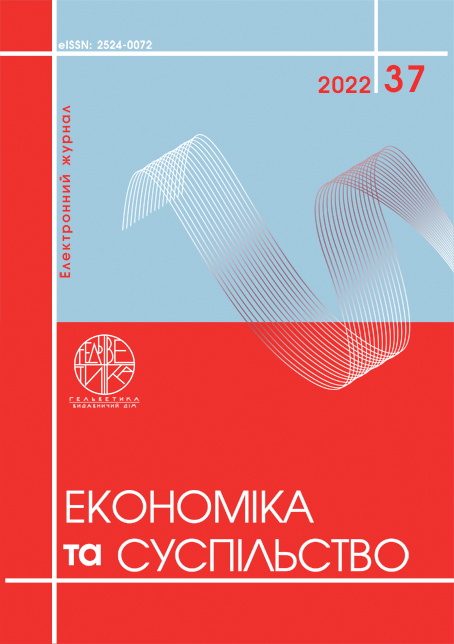ПЕРСПЕКТИВИ ФОРМУВАННЯ ТРАНСНАЦІОНАЛЬНИХ ПОДІЄВО-ТУРИСТИЧНИХ КЛАСТЕРІВ В ЄВРОПЕЙСЬКОМУ РЕГІОНІ
Анотація
Стаття присвячена питанням формування транснаціональних подієво-туристичних кластерів (ТНТПК). Досліджено формування туристичних кластерних формувань у світі. Проведено аналіз розвитку туризму у 20 країнах Європейського регіону. Розглянуто можливості формування ТНТПК для цих країн. За результатами аналізу було визначено чотири потенційні туристичні кластери, учасником одного з яких може бути Україна. Розглянуто переваги міжнародного співробітництва для країн-учасників ТНТПК. Зокрема, вирішення проблем рекреаційного перевантаження територій, створення платформ для розробки та реалізації міжнародних інноваційних програм розвитку туризму із можливістю використання людських та територіальних ресурсів країн-учасників кластеру.
Посилання
Бойко М. Ефект мультиплікації у туризмі: обмеження та можливості. Зовнішня торгівля: економіка, фінанси, право. 2016. № 4. С. 23–32.
Trunina І.M., Sushchenko О.A. Creation of innovation clusters as a line of enterprise competitiveness improvement in the field of foreign economic activity. Actual Problems of the Economy. 2016. № 3 (177). С. 191–198.
Trushkina, N., & Shiposha, V. (2021). Clustering of the national economy as an effective tool for the sustainable development of European countries. Three Seas Economic Journal, 2(4), 63–70. DOI: https://doi.org/10.30525/2661-5150/2021-4-11
N. Mulder (coord.), “The impact of the COVID-19 pandemic on the tourism sector in Latin America and the Caribbean, and options for a sustainable and resilient recovery”, International Trade series, No. 157 (LC/TS.2020/147), Santiago, Economic Commission for Latin America and the Caribbean (ECLAC), 2020. ISSN 1680-872X
Tarik Yalçınkaya, Tyulay Hyuzelʹ (2019) A general overview of tourism clusters. Journal of Tourism Theory and Research. Vol 5, Issue 1, 27–39. DOI: https://doi.org/10.24288/jttr.465912
Daniela Doina Fundeanu (2015), Innovative Regional Cluster, Model of Tourism Development. Procedia Economics and Finance 23 (2015) 744–749, 2212–5671. DOI: https://doi.org/10.1016/S2212-5671(15)00501-8
National Accounting Review Volume 2, Issue 4, 337–353.American rescue plan build back better regional challenge – frequently asked questions. URL: https://eda.gov/arpa/build-back-better/faq/#39 (дата звернення: 15.02.2022)
Ma Si. Manufacturing clusters key to economic growth. URL: http://english.www.gov.cn/news/topnews/202104/16/content_WS6078e3bfc6d0df57f98d7e9b.html (дата звернення: 23.02.2022)
Kowalski, A.M., Mackiewicz, M. Commonalities and Differences of Cluster Policy of Asian Countries; Discussion on Cluster Open Innovation. J. Open Innov. Technol. Mark. Complex. 2021, 7, 21. DOI: https://doi.org/10.3390/joitmc7010021
Porter M.E. Clusters and the new economics of competition. Harvard Business Review, 1998. № 76(6). Р. 77–90.
Вовк К.М. Управління розвитком подієвого туризму в регіоні : дис. д-ра філософії: 64.055.015 / ХНЕУ ім. С. Кузнеця. Харків, 2021. 264 с.
Сайт статистичної інформації. URL: https://ec.europa.eu/eurostat (дата звернення: 15.02.2022)
Overtourism and Tourismphobia: Global trends and local contexts. URL: http://surl.li/bsajz (дата звернення: 12.02.2022)
Perspective Destination the Netherlands 2030. P. 41. URL: https://www.nbtc.nl/en/home/vision-strategy/perspective-2030.htm (дата звернення: 02.02.2022).
Holland. URL: https://www.cityofholland.com/253/Completed-City-Plans (дата звернення: 02.02.2022)
Switzerland. Tourism in the economy. URL: http://surl.li/bsajy (дата звернення: 01.02.2022).
Фінляндія територія високих технологій. URL: https://www.businessfinland.fi (дата звернення: 21.01.2022)
Perspective Destination the Netherlands 2030. P. 41. URL: https://www.nbtc.nl/en/home/vision-strategy/perspective-2030.htm (дата звернення: 22.02.2022).
Polish Tourism organization. URL: https://www.pot.gov.pl/en. (дата звернення: 06.02.2022).
Boiko M. (2016) Efekt multyplikatsii u turyzmi: obmezhennia ta mozhlyvosti. Zovnishnia torhivlia: ekonomika, finansy, pravo. № 4. S. 23–32. (in Ukrainian)
Trunina I.M., Sushchenko O.A. (2016) Creation of innovation clusters as a line of enterprise competitiveness improvement in the field of foreign economic activity. Actual Problems of the Economy. № 3 (177). S. 191–198.
Trushkina N., Shiposha V. (2021) Clustering of the national economy as an effective tool for the sustainable development of european countries. Three Seas Economic Journal, 2(4), 63–70. DOI: https://doi.org/10.30525/2661-5150/2021-4-11
N. Mulder (coord.), “The impact of the COVID-19 pandemic on the tourism sector in Latin America and the Caribbean, and options for a sustainable and resilient recovery”, International Trade series, No. 157 (LC/TS.2020/147), Santiago, Economic Commission for Latin America and the Caribbean (ECLAC), 2020. ISSN 1680-872X
Tarik Yalçınkaya, Tyulay Hyuzelʹ (2019) A general overview of tourism clusters. Journal of Tourism Theory and Research. Vol 5, Issue 1, 27–39. DOI: https://doi.org/10.24288/jttr.465912
Daniela Doina Fundeanu (2015) Innovative Regional Cluster, Model of Tourism Development. Procedia Economics and Finance, 23, 744–749, 2212–5671. DOI: https://doi.org/10.1016/S2212-5671(15)00501-8
National Accounting Review Volume 2, Issue 4, 337–353.American rescue plan build back better regional challenge – frequently asked questions. Available at: https://eda.gov/arpa/build-back-better/faq/#39 (accessed February, 15, 2022).
Ma Si. Manufacturing clusters key to economic growth. Available at: http://english.www.gov.cn/news/topnews/202104/16/content_WS6078e3bfc6d0df57f98d7e9b.html (accessed February, 23, 2022).
Kowalski A.M., Mackiewicz M. (2021) Commonalities and Differences of Cluster Policy of Asian Countries; Discussion on Cluster Open Innovation. J. Open Innov. Technol. Mark. Complex. 7, 21. DOI: https://doi.org/10.3390/joitmc7010021
Porter M.E. (1998) Clusters and the new economics of competition. Harvard Business Review, № 76(6). R. 77–90.
Vovk K.M. (2021) Upravlinnia rozvytkom podiievoho turyzmu v rehioni [Management of Event Tourism Development in Region]. PhD thesis. Kharkiv, S. Kuznets KhNEU, 264 p. (in Ukrainian)
Sait statystychnoi informatsii (2022). Available at: https://ec.europa.eu/eurostat (accessed February, 15, 2022).
Overtourism and Tourismphobia: Global trends and local contexts. Available at: http://surl.li/bsajz (accessed February, 22, 2022).
Perspective Destination the Netherlands 2030. P. 41. Available at: https://www.nbtc.nl/en/home/vision-strategy/perspective-2030.htm (accessed February, 12, 2022).
Holland. Available at: https://www.cityofholland.com/253/Completed-City-Plans (accessed February, 2, 2022).
Switzerland. Tourism in the economy. Available at: http://surl.li/bsajy (accessed February, 1, 2022).
Finliandiia terytoriia vysokykh tekhnolohii. Available at: https://www.businessfinland.fi (accessed January, 21, 2022).
Perspective Destination the Netherlands 2030. P. 41. Available at: https://www.nbtc.nl/en/home/vision-strategy/perspective-2030.htm (accessed February, 1, 2022).
Polish Tourism organisation. Available at: https://www.pot.gov.pl/en. (accessed February, 6, 2022).


